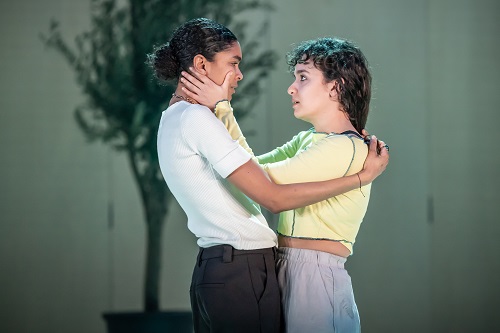Jessica Harris hails the RSC’s latest production.
There’s a wonderful restraint in this production of Julius Caesar that serves to accentuate the inner turmoil of Caesar’s deadly opponents. Many of the conspirators are played by women, and our insight into their minds is at its clearest and most compelling in Brutus, who is outstandingly performed by Thalissa Teixeira.
As the internal worlds of individuals unfold, so this is juxtaposed with a growing sense of foreboding, created by skilful character development and dexterous staging. A developing sense of menace in performances and the spare use of music suggest peril. The sparse set, focussed on a cube lit by strip-lights, and costumes of black, white and grey, indicate jeopardy. All of the production’s elements work together to create a piece which is taut and thrilling. Levels of violence and chaos in the politics of Rome are conveyed with subtlety, rather than loud-voiced proclamations, whilst dramatic tension is maintained by choreographed movements of conspirators and Roman crowds, their jerky movements presaging bloodshed and death.
It’s been said that Shakespeare should have named his play Brutus, rather than Julius Caesar, as it is Brutus’ struggle with what she deems to be honourable that centres the play. As she weighs up her love for Caesar, with her love for the republic of Rome, her course of action determines all else. When she hears that Caesar, newly returned from the victory of battle, has been offered a crown by Mark Antony, her concern that the republic may be overthrown by his growing tyrannical powers wins out. She joins with Cassius and other conspirators to kill Caesar and her striking of the final blow shows clearly which side she is on.
But as history bears out, the overthrow of one dictator does not mean the end of dictatorship. The conspirators, with the possible exception of Brutus, oppose Caesar’s kingship not because of his weaknesses, but because his rise to power would preclude their own. When Antony’s star rises, taking him into a power-sharing threesome with Octavius Caesar and Lepidus, he quickly dismisses the latter, and we foresee an early battle for power between him and Octavius.
Alongside the theme of tyranny runs the theme of manipulation. Cassius has no qualms in using her voice to turn Brutus against Caesar whilst, after Caesar’s death, Brutus and Antony vie with each other in their use of oratory to persuade the citizens of Rome to their side. Seeds of division and strife are sown and, once more, the slaughtering of one tyrant only to be replaced by another is foretold.
Shakespeare’s text brims with omens and portents, and this production exploits these to the full. In a highly stylised rendition, the body of Caesar is represented by his blood-stained shirt. As it lies on the stage and the conspirators dip their hands into the blood, black as ink, the Ghost of Caesar rises to later appear in a premonition of Brutus’ downfall.
Thalissa Teixeira as Brutus holds the stage throughout, whilst Nigel Barrett as Julius Caesar and William Robinson as Mark Anthony, both give compelling performances. Integrated casting and the use of signage adds a further rich layer to the piece, reminding us that there are many ways to communicate.
Without being heavy-handed, the production, directed by Atri Banerjee, makes clear comparisons with today’s world: a world where, in many places, power is becoming centralised in the hands of the few, to the detriment of the many. It grips from start to finish.
Julius Caesar is on at the RSC in Stratford until 8th April, and then on tour at venues around England until 24th June. For further information visit rsc.org.uk .
Pics: Marc Brenner (c)RSC.
